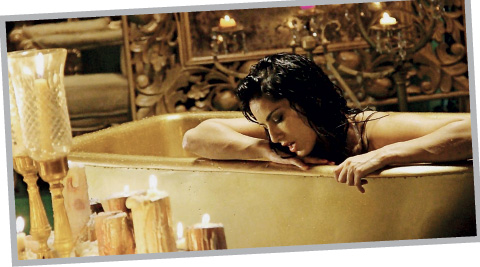Image may be NSFW.
Clik here to view. The tunes in this Sunny Leone-starrer may not be perfect in terms of musicality, all of it is even cheesy.
The tunes in this Sunny Leone-starrer may not be perfect in terms of musicality, all of it is even cheesy.
With most popular composers of today struggling to give us real chartbusters, producer Ekta Kapoor’s Ragini MMS 2 has the TV queen firing on all cylinders. That she has a music sense was clear in The Dirty Picture. This time she brings together the most unknown and unpredictable names (except Yo Yo Honey Singh) and gives Ragini MMS 2 some perfect little touches. At least in terms of music. The tunes in this Sunny Leone-starrer may not be perfect in terms of musicality, all of it is even cheesy, but what works for this one is the catchy melody, unique voices and those heady beats.
The album opens with Baby doll main sone de. A cracker of a track, it sticks from the moment the first hook hits us. One of the more vibrant item numbers after Munni, the star of the song is Kanika Kapoor, the raw texture of whose slightly shrill voice sounds right out of a ladies sangeet in the interiors of Punjab. There is also a Zandu Balm reference (second in the history of Bollywood music, first one being in Munni) in a coarsely crafted one liner that goes Laava Zandu balm je nachde pai jan thamka. What’s more interesting is the track’s orchestration, which is quite contemporary as all the beats have come out of an octopad. The trademark tumbi is the only Punjabi folk instrument, which rings throughout.
There is Yo Yo Honey Singh’s eulogy to alcoholism called Char bottle vodka, which shifts between buoyant and bittersweet. The infectious groove that borrows from dubstep, has an intoxicating beat and few lines of rap.
Main khud ko by Zahid Mustafa is a simple, romantic ditty, which opens with a soft sarod prelude. Mustafa sounds fine but not convincing enough. Soon the chorus sound better. A decent composition, the song craves an Arijit Singh and his smooth vocals. Enter Kshitij Tarey and his classically trained voice in the reprise version.
Overall the attempt to bring in a host of composers gives us a broth with various fun flavours. But then it only has four songs, two of them with an extra version and one with not much value.
— Suanshu Khurana
Clik here to view.
